Amid multiple delays and even controversies, Rocksteady Studios’ decade-long-in-the-making project, Suicide Squad Kill the Justice League, has finally been released. Now, the question here is: was it worth the wait? To answer that, we need to dive deeper into just what kind of game this is as a whole.
What Are We, Some Kind of Suicide Squad?
As you’d expect from the naming of the title, Suicide Squad Kill the Justice League revolves, well, around killing the Justice League. You play as members of the League’s rogue gallery, who, by comparison to them, are mere mortals outside of King Shark, who’s a demigod himself. Still, even with a god by their side, members of Task Force X, the official name given to the Suicide Squad, find themselves in an unfavorable position. Kill the Justice League, as they look at each other with a shocking expression, knowing full well of their past encounters. How will they achieve something they’re clearly outclassed to do?
That’s a question that the Squad has to find out themselves, and through it, a surprisingly fun journey filled with laughter, twists, and turns. It’s what you’d expect from a Rocksteady game when it comes to storytelling, despite the questionable plot direction.
Members of the squad are amongst the lowest and worst of the worst villains out there, each hand-picked by the ruthless and calculated Amanda Waller, whom Debra Wilson (Star Wars, Call of Duty) remarkably portrays.
But she’s not the only one to give a noteworthy performance. Every member of the Squad is fully fleshed out and developed despite being introduced (except Harley) to this universe for the first time. There’s no friendship, or honor amongst them, acting as if they’re some kind of dysfunctional family. But even the most broken of families can put their differences aside, and with all that is at risk, they’ll need to work together if they have any hope of getting out of this alive. It’s either be killed by an explosive in their necks, or kill the Justice League. A suicide mission as most would say, befitting of the Suicide Squad.
Characters are beautifully portrayed by the actors, constantly trying to one up each other and playing off the banter in a natural and humorous way. In the end, they’ll probably kill one another, but at least they get to have good fun. Fun that even I couldn’t help but laugh, as I slowly became invested with the characters
Kevin Conroy (rest in peace) as an evil Batman is fantastic, as we see a side of Batman and Kevin that we rarely see. Even if I didn’t fully agree with where the story went, you can tell Kevin was having an absolute blast voicing this version of Batman. He is, and always will be, Batman.
The other League members are also introduced into the Arkhamverse for the first time. Again, I’m not a fan of the direction the story takes them, but I can appreciate how it’s told and the stellar performance from each member.
It’s not often you see the Justice League as evil bastards, and I love how it’s reminiscent of The Boys (Amazon’s TV series). The League members are as twisted, power-hungry, and utterly full of themselves. It’s just too bad that they kept most of their gruesome and unhinged acts of violence to voice lines rather than showing them to the players themselves. This is a rated M (for mature) game, but unfortunately, none of that horrific fun of pushing that M is shown by the League members, despite them making threats of things they would do.
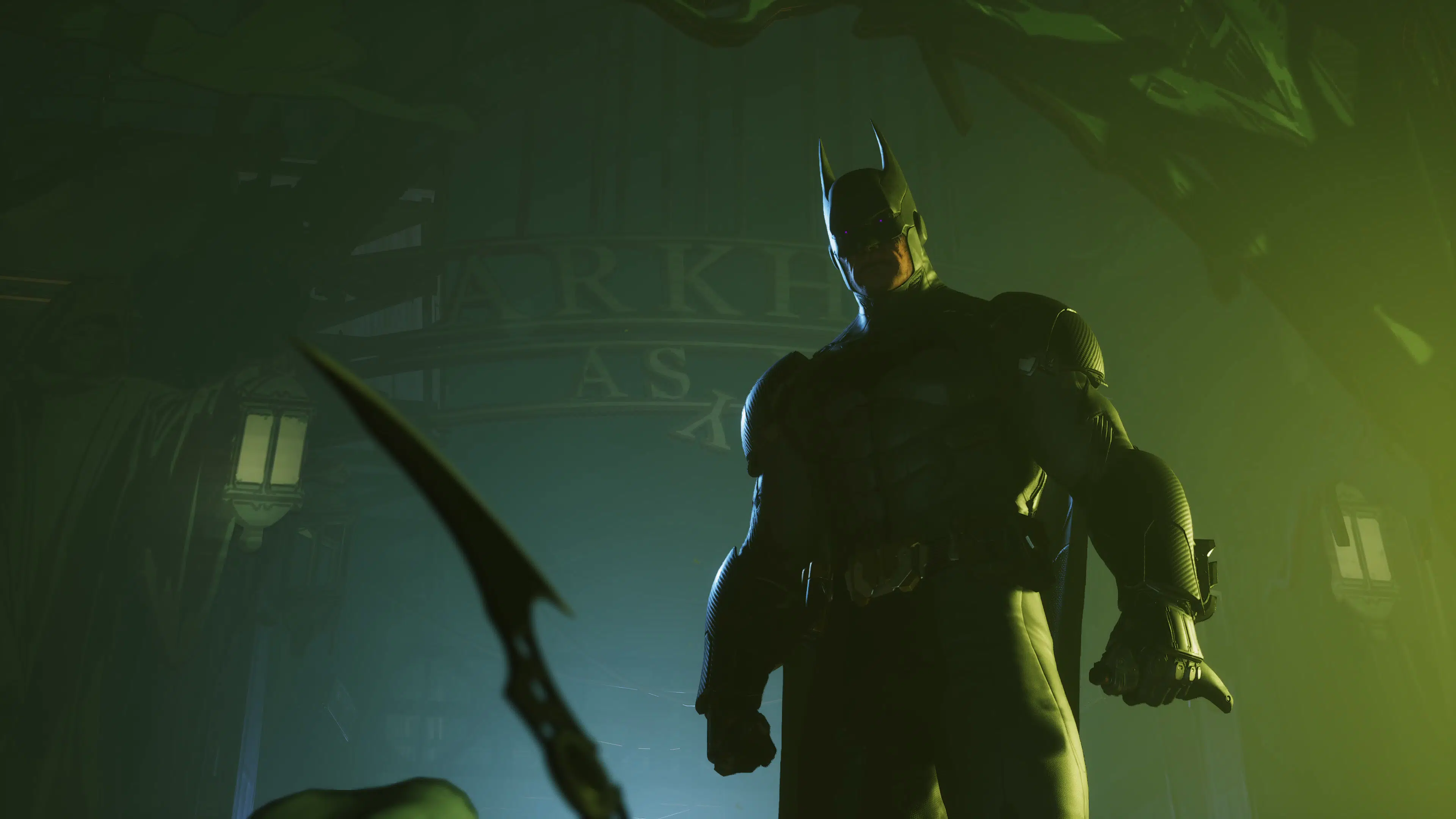
Still, the campaign and the story that Rocksteady had told with Suicide Squad Kill the Justice League was delightfully entertaining to play through. It’s not the direction I was hoping to see it go, but I still enjoyed it.
That, sadly, is where my enjoyment nearly ends, as in between the narration and cinematic moments, you’ll find that the game itself is cobbled up with some rather uninspiring missions that serve as the basis to the end game loop. They’re repetitive, rinse-and-repeat missions, the kind you instantly know of when you hear the term GaaS (Games as a Service).
The push for GAAS robs the game of having any real meaningful side content, as most of the missions fall within a few categories, those being capture and defend, survival, search and destroy, and escort missions.
That last mission type is the bane (get it, BANE) of all mission tropes and gets used so often during the story I couldn’t help but feel it took away from the experience with senseless padding. The missions, in general, are there to pad the campaign out, which eventually gets recycled for the endgame with some variations here and there. But no matter how many modifiers get thrown at you, the missions themselves are still the same, with the same objective over and over.
I’m not saying you can’t have fun with it, but you should go in knowing that nothing changes for content from the first few hours to the end to 20 hours into the endgame besides loot, modifiers, and difficulty level. Incursion missions, which sees you teleported to another Earth, are essentially higher-difficulty versions of the mentioned mission types. It’s the looter loop, but being a Rocksteady Studios title, I expected more.
The Batman Arkham games share a similar loop of rinsing and repeating, but it’s how you do those things and how the series rewards players afterward.
Sure, you may be crawling through a vent and stealthily taking down enemies for the hundredth time, but you’re also doing that with the expectations of something new being introduced, be that in the form of a puzzle that takes advantage of the newly acquired Batgadget, or some new slice of story from a side quest that adds to the lore of the universe. There’s creativity when it comes to doing things repeatedly in the Batman Arkham games, and each time, it plays into the strength of Batman.
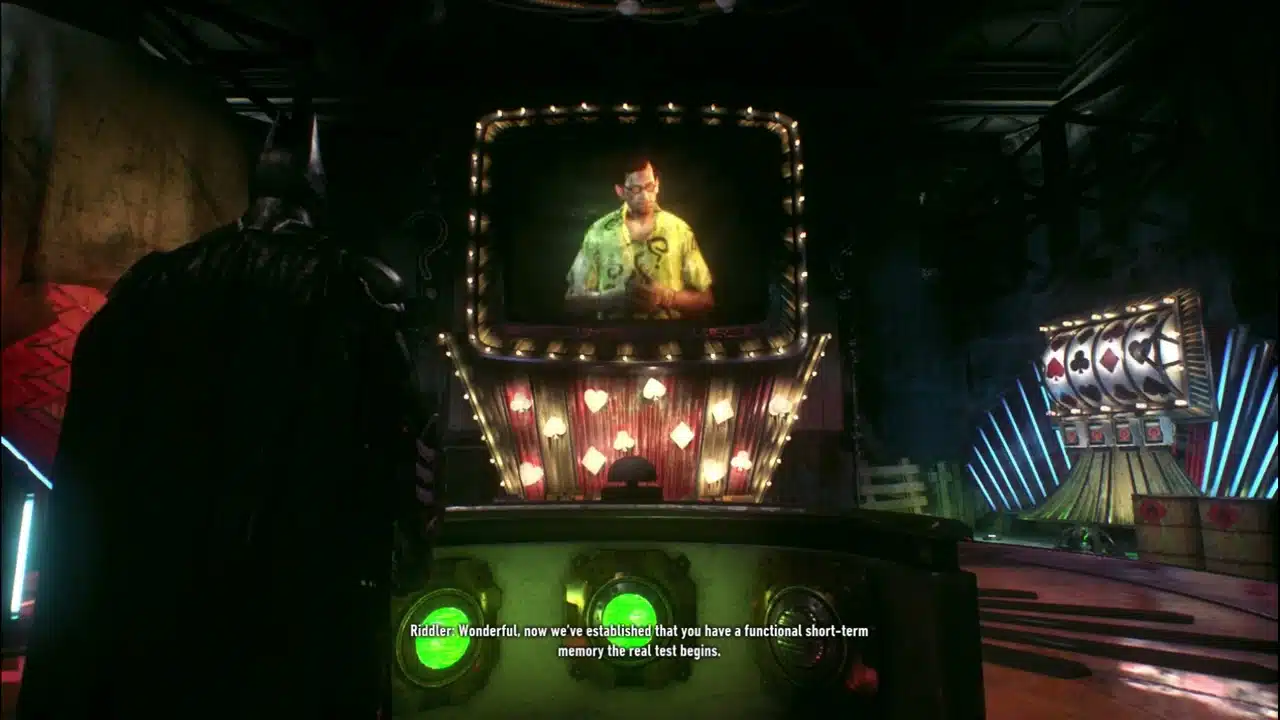
You don’t get any of that with Suicide Squad. What should have been built and improved upon instead gets torn down in favor of mindless shooting., There are no random encounters, be that with other heroes who may be in the city fighting or other villains who may be trying to swoop in to take advantage of the chaos. The closest thing you get is the Riddler and his puzzles, which have been vastly dumbed down for this game. The Riddler himself will even joke about his puzzles not being as good as they were before, chalking it up to being rusty since Batman left. Mind you, Batman has been back for years now, with reports of a demon terrorizing the Gotham’s villians between the time of absent.
I’m not saying all those side stories in the Arkham games are great, but they all add to the presence of Gotham being a living world. Things are going on outside the story, and you experience said things whenever you decide to veer from the campaign. I’ve seen the complaint thrown around that the world in Suicide Squad looks lifeless, with the explanation being that Brainiac wiped most of the population out.
That’s fine, but looking back at the Arkham games, could you honestly say those games had worlds filled with a population out and about? Heck, Arkham Knight goes for the same excuse of having a “dead” world by explaining the city has been mostly evacuated. Yet that world still manages to breathe on its own by telling and showing the player that much more is happening in the city. Gotham was as big of a character as Batman himself.
There are no Manbat moments of any kind, no Professor Pig-like villain going around and kidnapping who’s ever left, no craze man trying to steal your identity while you’re already dealing with a city-ending scenario or any other random encounters that would reward you for just exploring the city. None of that exists in Metropolis.
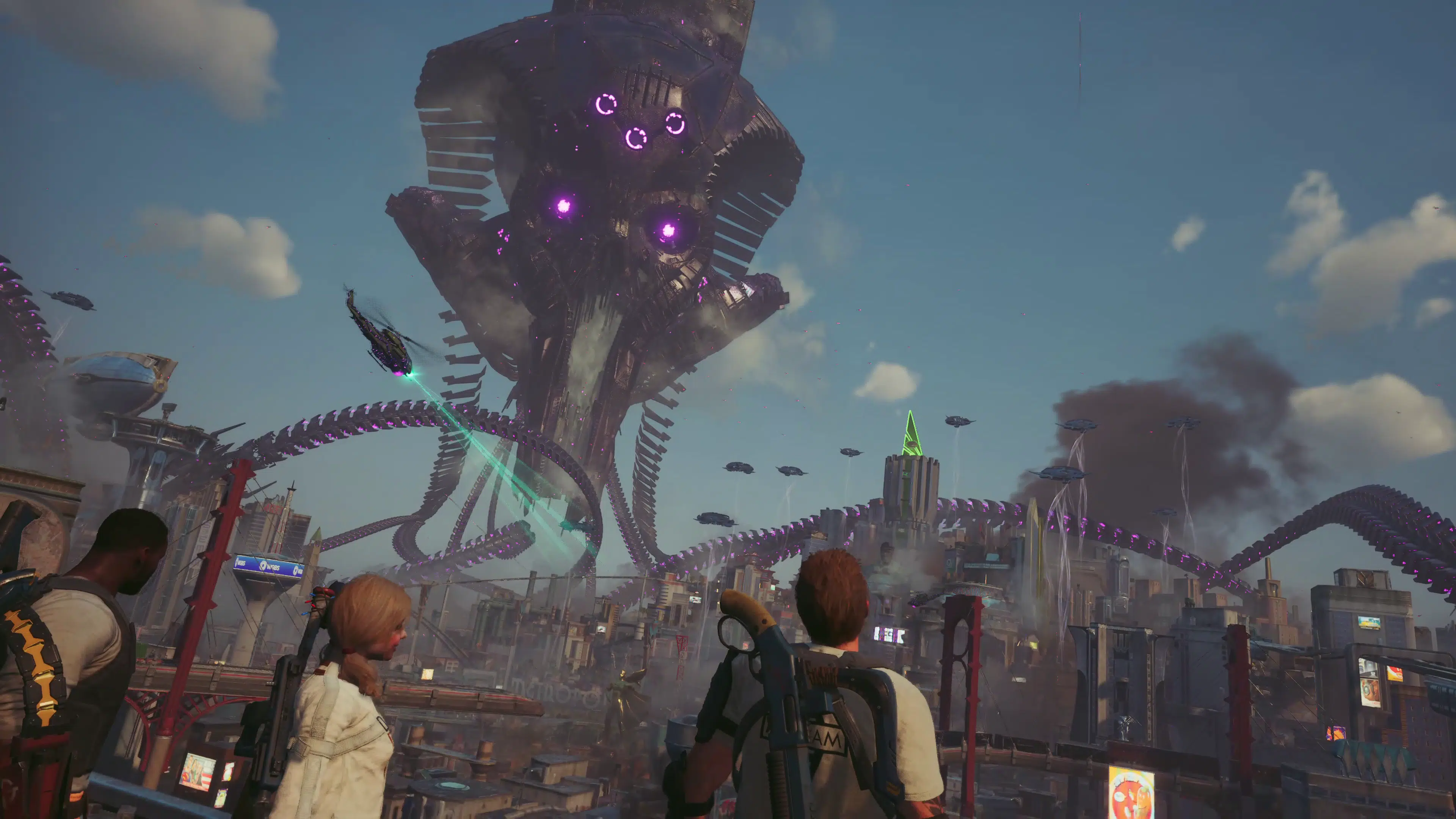
Sure, the logic may be, why would any villain come to Metropolis, given all that’s happening? You’re right, but logically, why would anyone think a group of human characters (outside of maybe King Shark) would even stand a chance against someone like The Flash, Green Lantern, and Superman when they’ve all been defeated by Batman prior? Don’t answer that; it’s called plot armor, and Suicide Squad’s characters are heavily coated in it, despite The Flash phasing through someone in front of the squad in a mere second, only to leave them because of plot armor.
But fine, let’s stick with the reason that villains are too scared to visit the city. Then why does every current character, The Penguin, Gizmo, Ivy, Toymaker, Rick Flag, and Amanda Waller, have to issue the same missions? There’s a city booming with wealth, yet the only thing these criminals want is for you to point a gun and shoot monsters. You would think Penguin would be seizing the opportunity for his own personal gains, even if he’s under Waller’s control.
It’s not like no other characters are in the city, either. Lois Lane makes several appearances in the form of news broadcasts. There is one instance where she’s offscreen behind a door that she unlocks moments later, but you never see her in person as she has apparently inherited Batman’s ability to vanish out of nowhere. She’s a character who has never been scared of being in the middle of the action, yet she spends the whole game behind a camera in some hidden location. How come she never gives the squad any missions that could probably be built as investigation-type missions? I’m not saying I want that, but it’s an idea.
Plenty could have been done with mission variety, yet when someone thinks of a GaaS title, Suicide Squad Kill the Justice League fits the bill to a T. It’s an endless grind replaying missions that get old fast. It’s surprising how big the game is and how little content outside the story it has.
The worst part is how the story suffers because it’s a GaaS. It’s disappointing and hilarious how it ends, as it hypes itself up by the fact that the squad gets to do a bunch of stuff over and over again, all for some better loot. As if I didn’t already know from the ten-plus hours spent on the story that this was some looter shooter GaaS title, it reminds me yet again of that very thing at the end.
The game has an “ending,” but it’s one to tease more content, which becomes clear once the credits finish rolling. It turns out said content isn’t even in the game yet but is coming later in the roadmap shown in the game. It’s such a bizarre way to go about it: tease you right before the credit rolls, only to tell you it’s not in the game yet. Seven-plus years in development, and not only is the campaign incomplete, but it does so knowingly to fit the GaaS model and to remind you of that. It’s like purposely keeping the real ending out so they can ship it as DLC. Remember Capcom’s PS3/Xbox 360 title, Asura Wrath? It’s a pretty awesome game overall, except that Capcom released an unfinished game to sell the rest off.
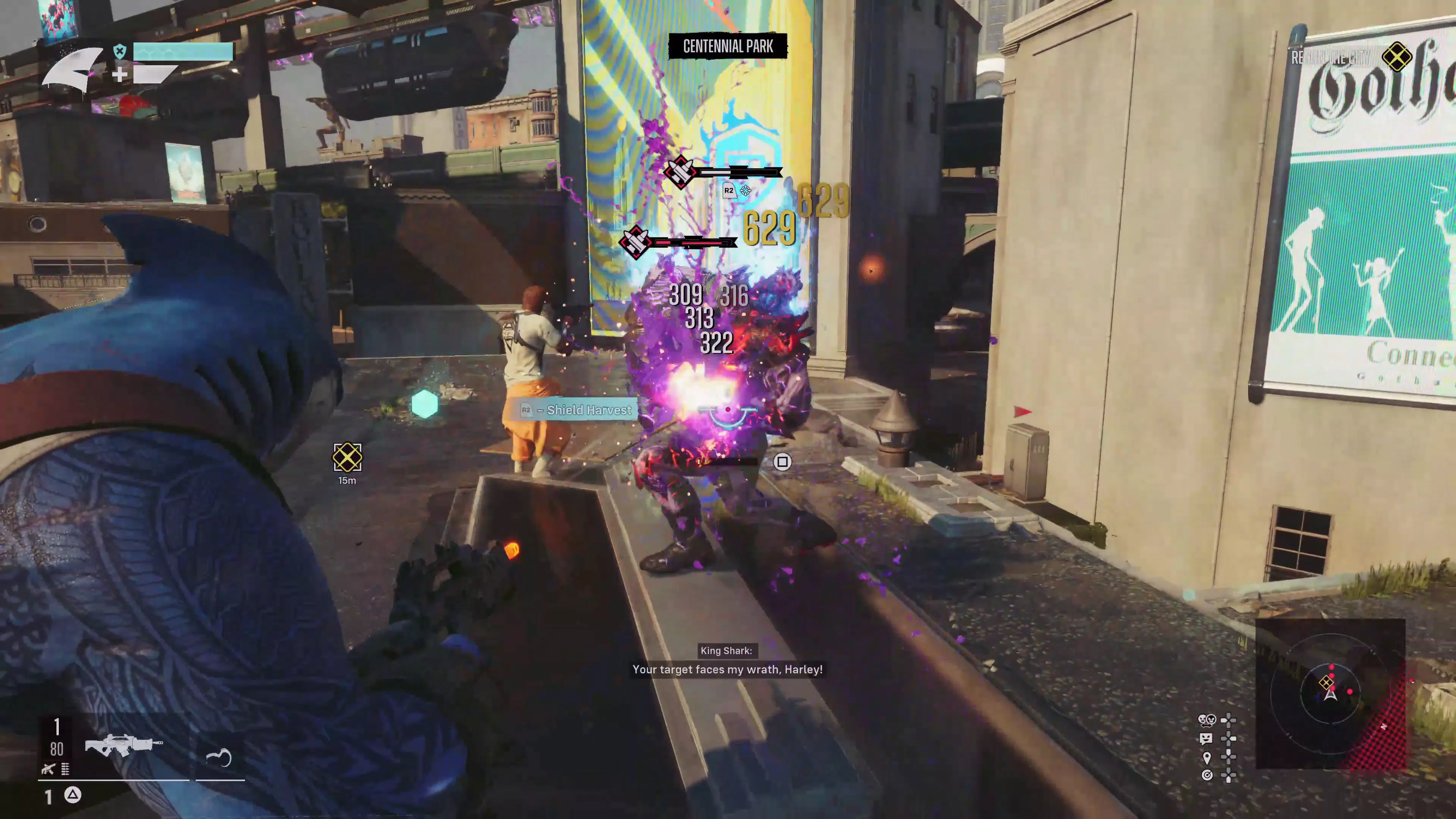
Now, in Suicide Squad’s defense, the teased content is all being released for free. The studio has already outlined a year of support. So, we will get the rest of the game throughout the year. But why does that even have to be the case? It’s unfinished business, which was always left for the players to do after beating the campaign in past Arkham games.
I know I brought Arkham a lot into this, and it won’t be the last time, either. I do want to make it clear that this isn’t me saying I wish Suicide Squad were a Batman game. A lot of those gripes I’ve had about Suicide Squad aren’t exclusively due to the Batman games. Batman didn’t invent side quests. Rocksteady just did them so well that, for many, they’re so memorable, and to see Suicide Squad not have any of that is just heartbreaking to me. Given the super long development time, it’s perfectly logical to have expectations for these things…things that should have been expanded on, not completely removed.
Let’s not forget how massive of a gamble this is on Rocksteady’s part. I’ve no doubt we’ll see the first year of content make it out, but there’s always that chance of things not happening. We’ve seen it for tons of GaaS titles, then just suddenly shutting down or ending support. Sure, it’s a DC property, and you might think that makes it safe, but remember, Warner Bros. Games’ parent company, Warner Bros., did cancel a fully completed movie (Batgirl), all for tax reasons. I’m saying that anything can happen, and I wouldn’t like to put my faith in a basket that is so volatile to the success of a product.
It’s Not an Arkham Issue, It’s a Character Issue
I’ve made plenty of comparisons to the Arkham games already, but I didn’t compare much on how the Suicide Squad is a departure from the gameplay and combat of the Arkham games. I’m not going to either because I’ve come to terms with the fact that different genres of games can exist within the same IP and universe a long time ago.
Mario is one proof of that; they went from making 2D games to RPGs and even sports games like Mario Kart and Tennis. You’d never catch me ripping on a game for not being the same gameplay genre because IPs can take the form of different genres. What matters at the end of the day is whether they’re good. Mario has retained that no matter its genre, it can still deliver exceptional experiences, so why can’t other IPs do that?
I know it breaks fans’ hearts that Rocksteady went from making one of the most successful single-player games to chasing the GaaS train with this, but I’ve remained optimistic about it, waiting to see what it turned out to be. I’ve already given my thoughts on the story, and I feel that Rocksteady shows that they still can tell a great story, even if some of the decisions made aren’t ones I agree with.
And despite being critical about the GaaS side of it, if you look at this game as a looter shooter, it has everything you’d want out of one, minus the lack of meaningful content.
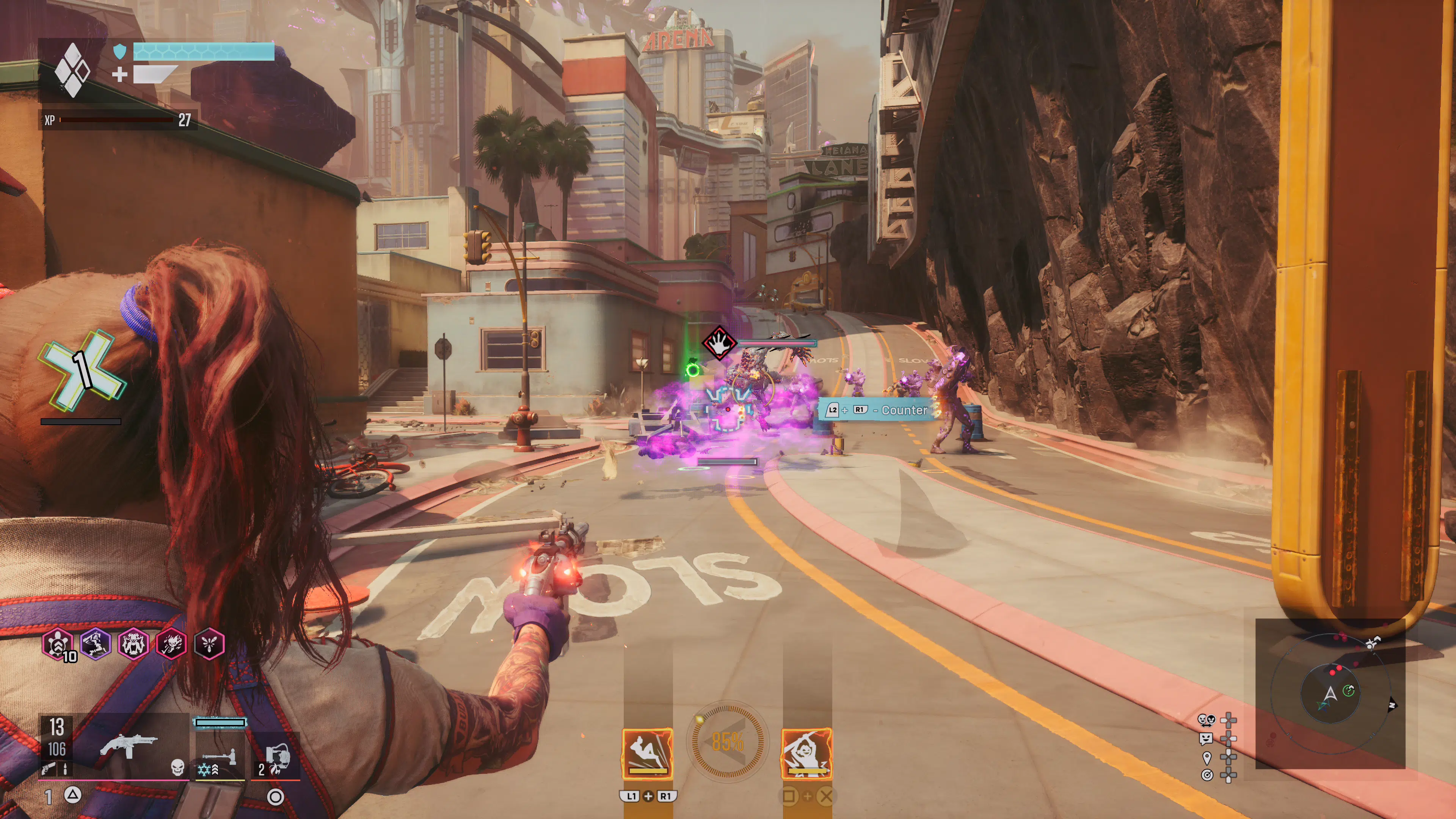
Suicide Squad Kill the Justice League, as a third-person shooter, does feel fantastic to play. Honestly, it’s one of the better shooters in the looter genre. I had fun playing, and if it wasn’t for stuff I mentioned prior about making sacrifices to fit the GaaS model, I could see myself loving this game.
But I’ll even say that the gameplay suffers from being a GaaS, because it lacks a bit of identity when it comes to its characters. There is a reason why the Arkham games are so successful, and it’s the reason why Insomniac Games’ Spider-Man games are such hits, too. These are games that have managed to capture the very characters you’re playing perfectly.
I don’t see a problem with Suicide Squad Kill the Justice League not being an Arkham game set in the Arkhamverse; the problem I see is that the game is not what the Arkham games represented for Batman.
When you play any of the Batman Arkham games, including Origin, and compare Suicide Squad to it, it’s clear to see the difference, but I think the biggest one is that the Arkham series made you feel like Batman. The story, in all honesty, could have been worse, yet the moment you jump into that world, you feel like how Batman would feel. His personality and the way he moves and fights are all part of his identity. When you get a new gadget for Batman, you instantly go, yep, Batman would do this, which you experience throughout the series.
Suicide Squad doesn’t have that for its characters past the story. All four squad members play almost the same, except for the super abilities they got from the Hall of Justice.
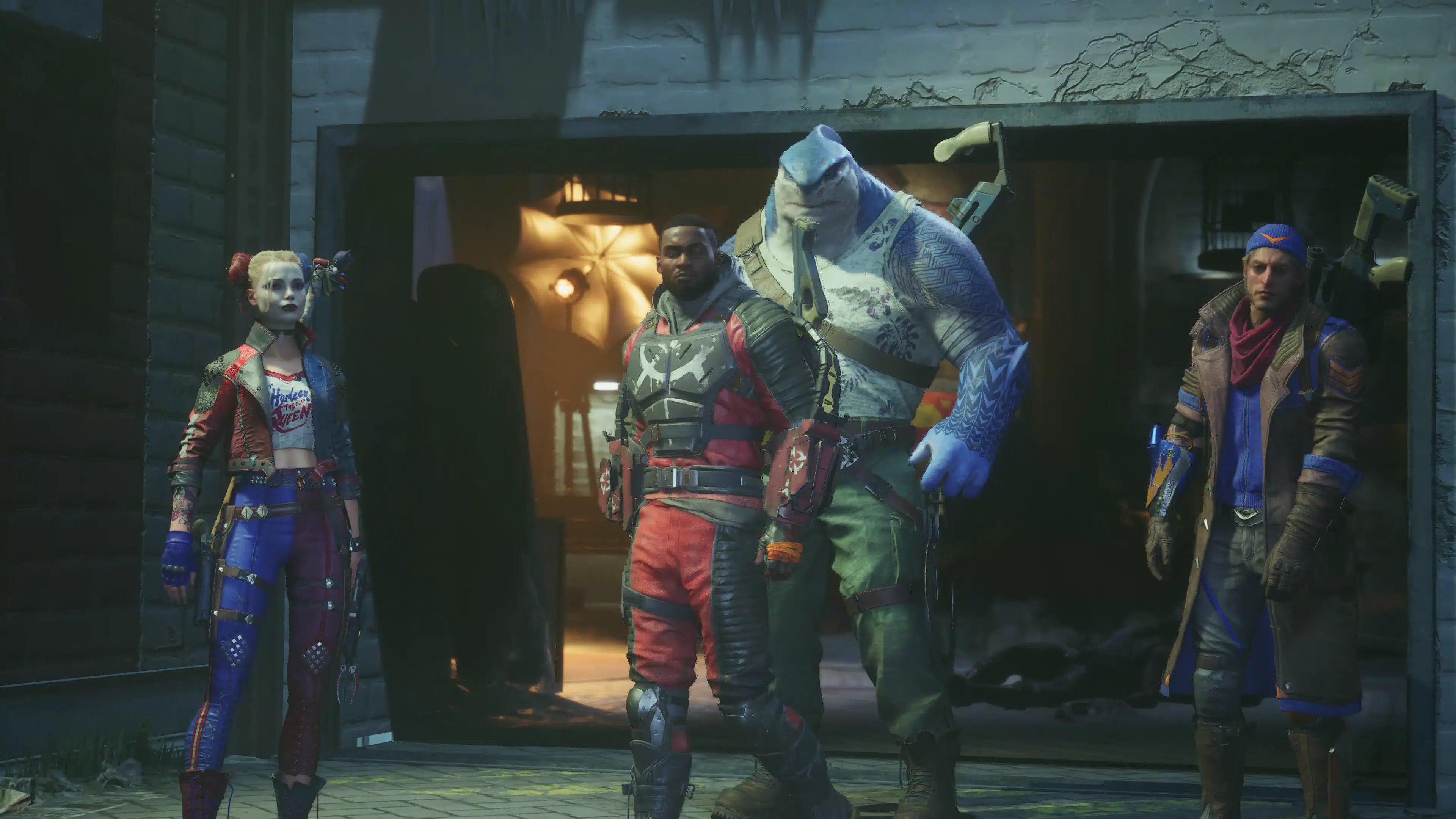
They may act like them with dialogue and in the story, but do you feel like you are playing Harley Quinn, King Shark, or Captain Boomerang? Yes, I left out Deadshot because he’s the only one where you can honestly say, yup, that’s probably how Deadshot would play.
This goes back to the public’s early criticism some had of the squad members using guns. I am aware that they’ve all probably used guns at some point and that it’s not out of the question that they would use them. But how often have we ever seen them using this as their main weapons? In most encounters that Joker and Harley have with Batman, they pull a gun out first, but that always gets taken away from Batman, resulting in close-quarter combat.
Harley is more known to use a hammer in her early years, eventually going to a bat. What about King Shark? I don’t think I ever remember him using a gun, but I could be wrong. Captain Boomerang, it’s in his name; he throws boomerangs, as silly as that may be.
Have a look at the characters in some recent mediums:
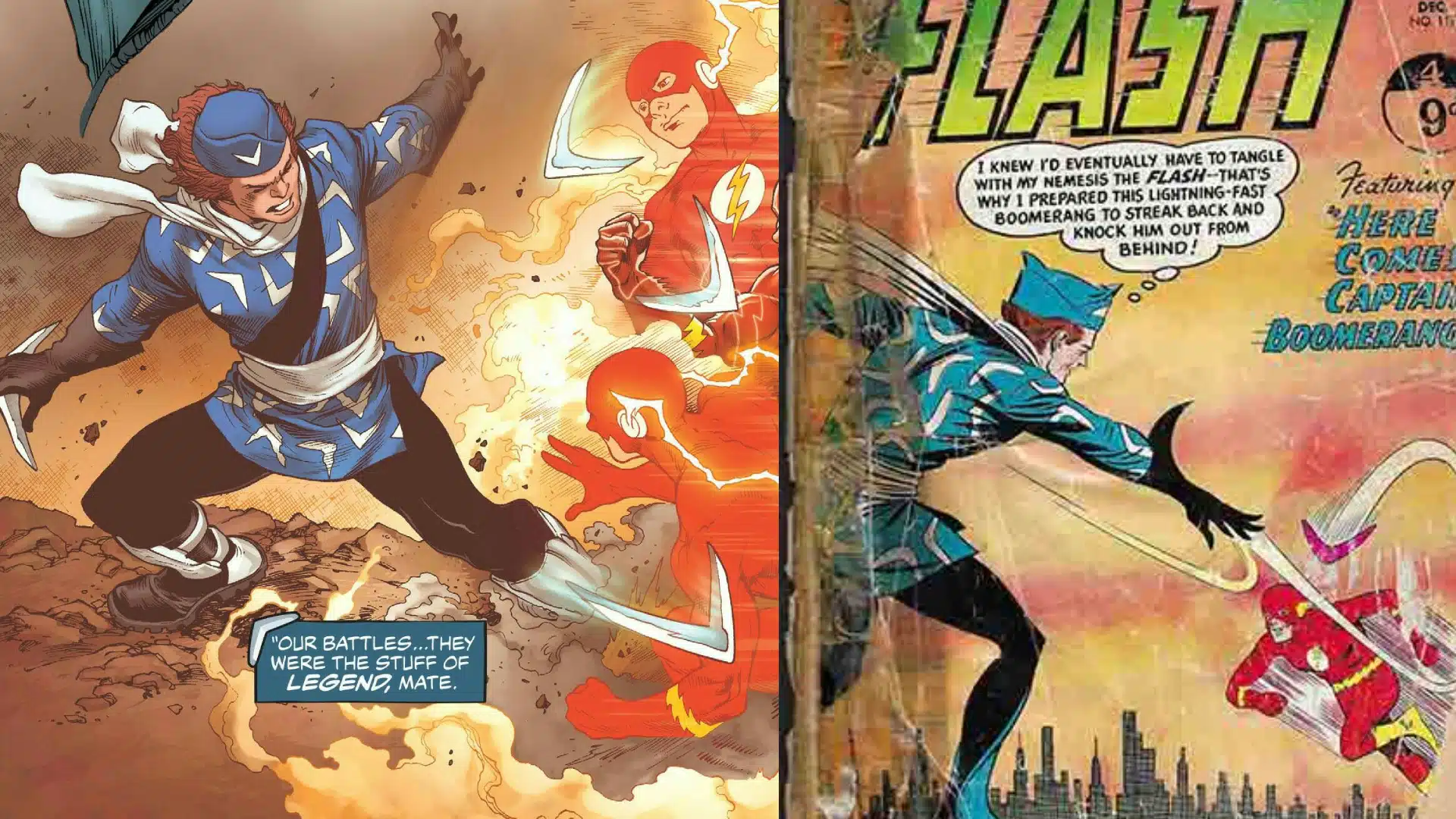
You catch my drift, right?
This is honestly my biggest criticism of the game. I don’t have a problem with Rocksteady going the GaaS route, but it’s blatant. The excuse will always come back that they’re fighting gods, but that has never stopped these villains from sticking to their gimmicks. No matter how many times Captain Boomerang has fought The Flash, he still fights him with boomerangs, even if it’s dumb. Those boomerangs are more than just weapons to him, and that’s something that is forgotten in this game.
Rocksteady could have done much more to make these characters stand out in combat than going the third-person shooter route. In nearly all forms of media, Batman rarely uses a gun, and he’s gone up against Superman, Darkseid, and so many others. His plot armor is strong, but it works. Why is the solution to fighting him the same as what any grunt in the universe reverts to, and why does Batman suddenly have trouble with that? Why do any members of the Justice League have trouble with that?
That should tell you something right there. A standard grunt could have probably filled the squad role, and it wouldn’t have made any difference in gameplay because it was built to fit the GaaS model rather than built around the characters’ strengths.
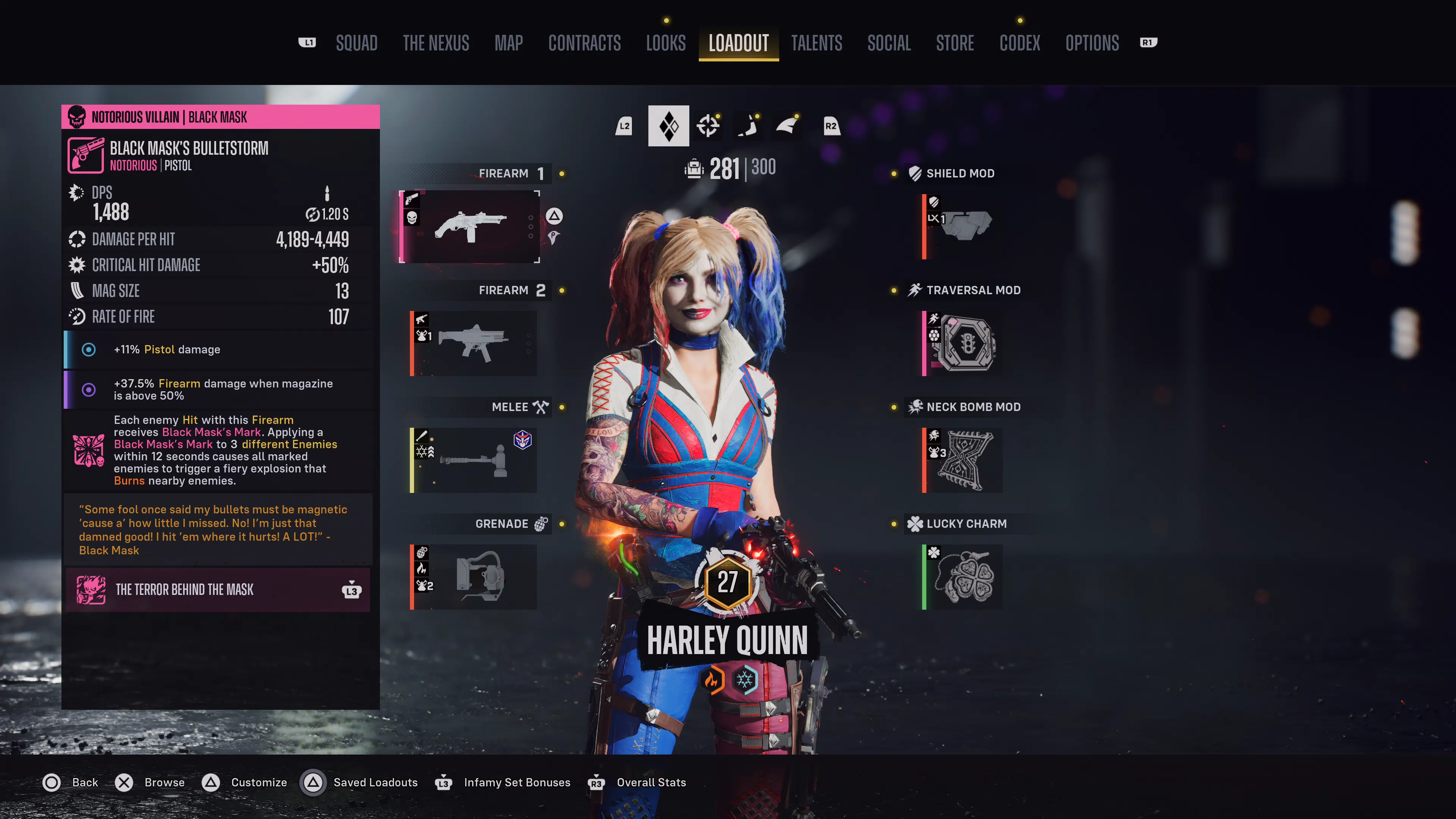
This is something that even Gotham Knights understood, and those were characters that shared more in common than the ones in the Suicide Squad, yet they were all created to play differently, an aspect praised in my Gotham Knights review.
Does that make it a bad game? Not all of it, but it lacks identity between the characters that is only shown in the dialogue and by interaction. That ends up showing in the gameplay, though if you’re a fan of third-person looter shooters, I suppose you’ll feel right at home. You can have fun and enjoy what’s being offered, but that doesn’t detract from the glaring issues.
One Mission You May Want to Wait On
Some may disagree with this, but I don’t have a problem with Suicide Squad Kill the Justice League being a GaaS game. I’ll stand by that opinion because, as I’ve said before, every IP out there can go after whatever genre and style of service they want. They just have to be able to execute them in a way that can convince gamers to get on board. That’s not the case for Suicide Squad Kill the Justice League.
Being a looter and a GaaS doesn’t mean you have to follow the genre’s norm, and Rocksteady had a real opportunity here to really be different from other Gaas looter shooters. There are some excellent mechanics in Suicide Squad that other looters should have, but in the end, they don’t do enough to carry it through with what’s there for the post-game. That is unless you like turning your brain off entirely, but that doesn’t make the criticism disappear.
The studio chased after the promise of what GaaS could bring but, in doing so, forgot what made people love them so much. There are still moments of that seen in the campaign, and I would still recommend any fan to play it at one point. But here, right now? Probably not, at least not at the asking price for an incomplete experience.
I’m not mad, I’m just disappointed. Disappointed by the potential of what this game could have been, and disappointed by what we got.
Score: 6.5/10
Pros:
- The story is great, even if it goes in a direction most won’t like, it still has that Rocksteady charm to it.
- Overall gunplay is solid for being a looter shooter.
- Metropolis is beautiful, as are the rest of the visuals.
Cons:
- Incomplete story that ties GAAS to it awkwardly.
- Mediocre mission structure that has little variety, makes for one boring end game.
- Characters all play the same outside of traversal abilities. There’s no real sense of identity between them.
- Lifeless world – There’s not much outside of Riddler trophies in it, and the repeats of missions. No Arkham-style side stories to explore for Metropolis.
- Always online – Servers were down during early access, but there were other times it went down. No reason for it to have this, even if it is coming later post-launch; this is what’s there now.
- I didn’t speak about multiplayer, but finding matches was near impossible, and when I did or jumped in with friends, the lobbies suffered from horrible lag. It’s unplayable once it starts happening.
- Boss fights are super easy, even on the highest difficulty. The final boss is even a reskin of an earlier fight.
Suicide Squad Kill the Justice League review code provided by the publisher. You can read MP1st’s review and scoring policy right here.
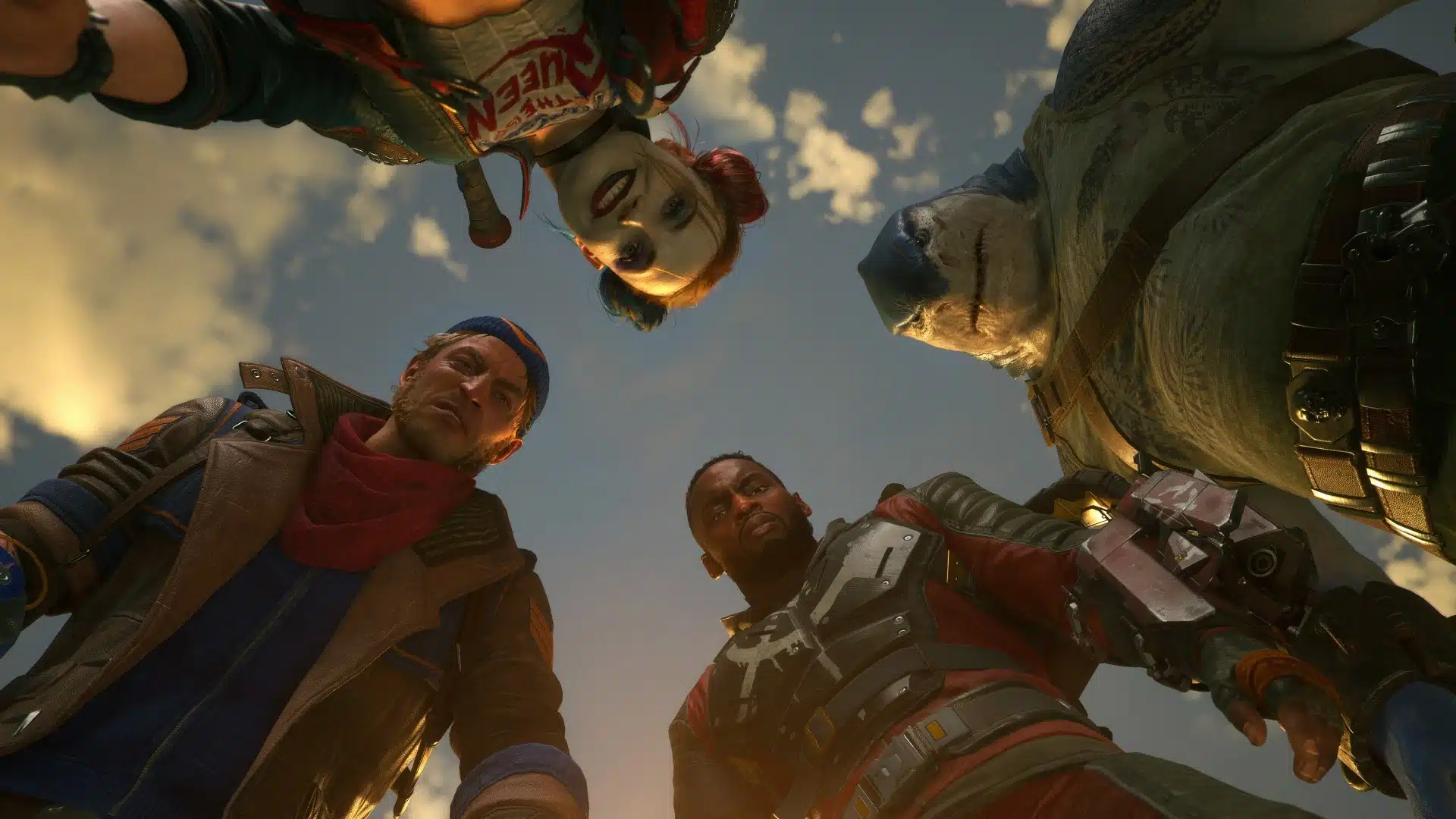
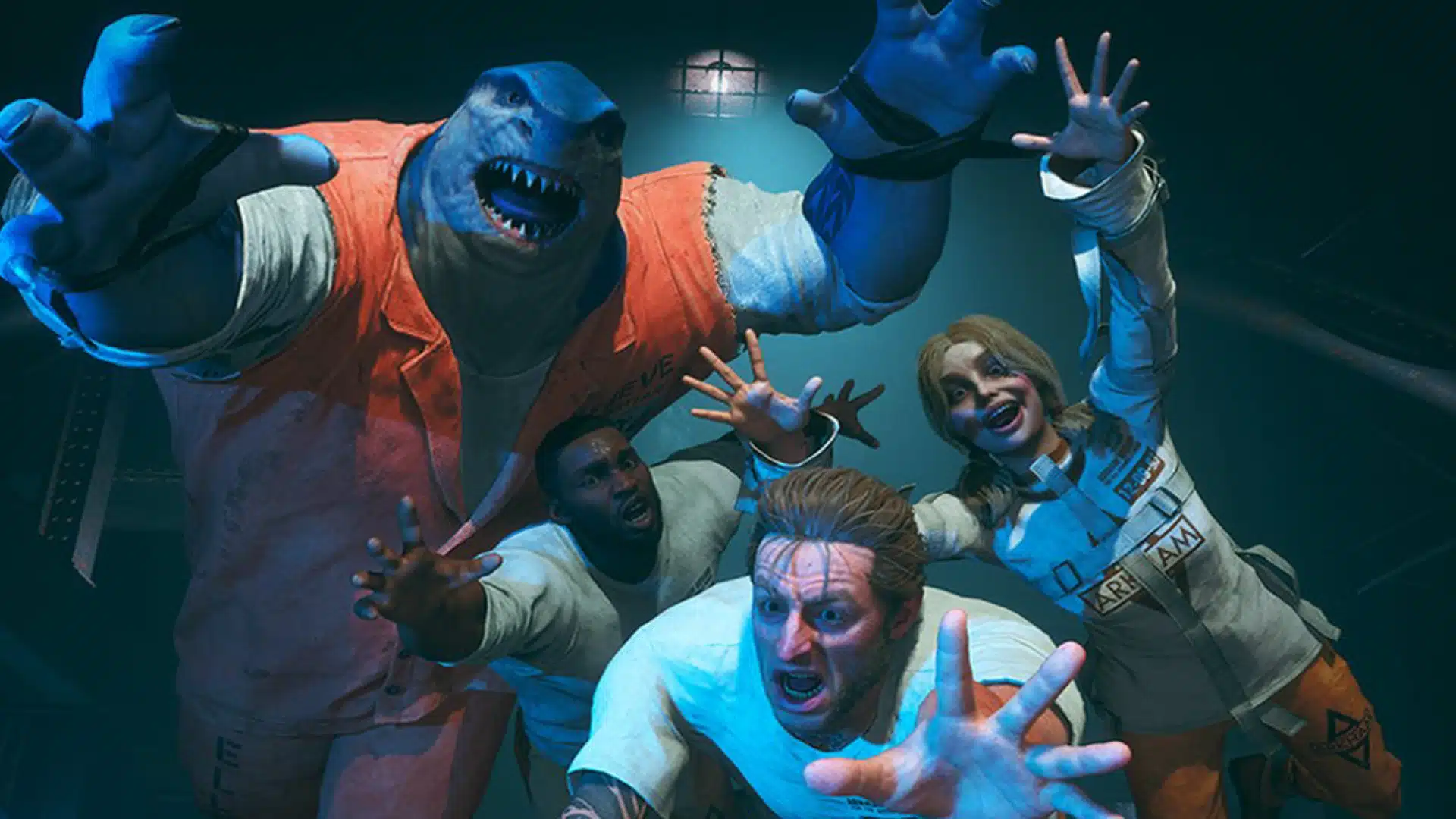
No thanks, i’ll wait until it gets discounted. Not a fan of always online games or online games in general, if they implement an offline mode i’ll consider it.